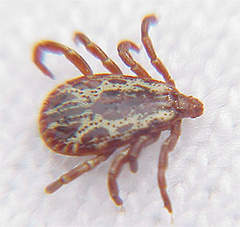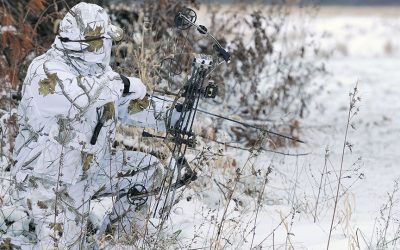The Game, Fish & Parks lists numerous seasons in their literature and on their web site, but, there is one you will not find listed there, the tick season.
These nasty little bugs can be a royal pain, but do not let them stop you from going out, you will want to prepare yourself for tick season the same way you would for the other outdoor activities.
Ticks come out in the spring, about the time outdoorsmen and women head into the woods looking for morel mushrooms, wild asparagus or hunting turkeys, but do not think that is the only time they are active as they hang around throughout the summer.
Do not let a little critter like a tick keep you from getting out into the outdoors this year. If you are prepared, there are several things hunters and those of us who love the outdoor can do to prevent ticks from hitching a ride.
There are two groups of ticks, the hard and soft ticks.
In the upper Midwest, it is the hard ticks we find in wooded, grassy, or other densely vegetated areas, the areas where mushrooms and asparagus is.
Soft ticks tend to live in bird nests, on rodents, and on bats. Either of these ticks can find their way onto us, but there is no species of tick, which depends solely on us for survival.
Some ticks take up residence on a certain hosts; luckily, we are not one of them.
Females can lay many eggs, anywhere from 3,000 to 11,000 eggs, so we should do what we can to prevent them from catching a ride from us.
There is only one-way to avoid a tick borne disease to not to go into areas they reside. DUH, like that is going to happen if you are an outdoorsmen or women that spend every spare moment out in the field or woods.
Since we know we are going to be in the same areas where ticks reside, here are a few simple precautions that can reduce the chances of a tick encounter.
Because ticks come up from the ground or grass onto you, it is a good idea to block any route they might have as they attempt to get on your skin. You will want to tuck your pant legs into your boots and your shirts into your pants and for extra protection, tape those areas where the clothes meet with duct tape, and on the next to the last application, to twist the tape so the sticky side is out and then make another wrap.
Ticks are dark colored, so wearing light-colored clothing makes it easier to spot ticks crawling around before they get on your skin.
Repellents containing 0.5 percent or more of Permethrin works well as a great tick repellent and often used on clothing. Some products containing Permethrin may remain on your clothing fibers even after washing.
When you get back home, check all your clothing before going into the house and once inside, do a whole-body inspection, washing your clothing as soon as possible.
Do not forget about your dog, man’s best friend as they can pick up ticks in your yard, if you take your dog out with you on your outdoor excursions, do not forget to protect it.
There are several commercially available dog dips containing Amitrax or Permethrin, which provide dogs with tick protection for two to three weeks per treatment.
For the very best tick prevention for your pet, contact your local veterinarian as some of them such as Cedar County Veterinary Services offer canine dips at certain times of the year where your dog simply swims through a tank of treatment.
Veterinarians also have prescribed treatment options, most of which can last for a month or more.
Once you find a tick attached to your skin, remove the tick as soon as soon as possible and then disinfect the affected area following the ticks removal.
According to recent research, the best method to remove a tick is to grasp it close to the skin with fine-tipped tweezers, place your tweezers close to and right up against the skin grasping the base of its mouth parts not its body.
Pull gently and straight away from the skin until the tick comes free. It is best to grasp the tick from its back to its belly, instead of from one side to the other, helping to keep the tick’s mouth parts from remaining embedded in the skin. The sooner you remove a tick, the less chance it will transmit a disease to its host.
One of the most common diseases transmitted by ticks is Lyme disease and each summer cases of this disease grow.
After a tick bite, Lyme disease may take several weeks without any signs of illness, making diagnosis difficult. Years of pain, physical and mental impairment can result if untreated.
Some other tick diseases often show signs up within two to five days of a tick bite and are easier to diagnosis.
Tick borne diseases may progress so rapidly that delaying a day or two of diagnosis and treatment may result in death.
If you have signs of severe or persistent headaches, fever, soreness or stiffness in muscles and joints, appetite loss, fatigue, or a skin rash occurring within three weeks after a tick bite, immediately contact your doctor. Figuring it out early and early treatment is critical.
Gary Howey, originally from Watertown, S.D., now residing in Hartington, Neb. is a former tournament angler, fishing & hunting guide, an award winning writer, producer, photographer and broadcaster, a recent inductee into the “National Freshwater Fishing Hall of Fame” in 2017. Howey is also the Producer-Co-Host of the Outdoorsmen Adventures television series and Outdoor Adventures radio. If you are looking for more outdoor information, check out garyhoweysoutdoors.com, outdoorsmenadventures.com and like Gary Howey’s Facebook or watch his shows on www.MyOutdoorTV.com






0 Comments